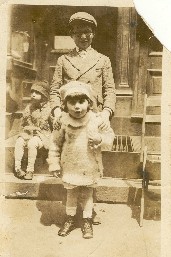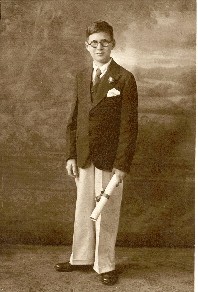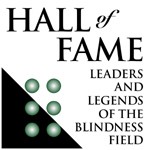Role Models: Abraham Nemeth
His parents taught him he could do whatever he wanted–he just had to think of a way to do it
Dr. Abraham Nemeth has led a long and interesting life—one that is difficult to condense to a few magazine pages. Nemeth, who was born blind, became a renowned scholar of mathematics—afield once considered too difficult for people without usable vision. Creator of the Nemeth code for Braille mathematics, he was a professor of mathematics for 30 years at the University of Detroit. He retired in 1985.
"Retired" is a relative term, however, and Nemeth has remained very active. He serves on the Research and Development Committee of the National Federation of the Blind, through which he has developed a talking scientific calculator. Currently, he is working to upgrade this calculator by making it programmable. He recently completed a two-year term as chairman of the Michigan Commission for the Blind.

I was born in 1918 on the Lower East Side of Manhattan. I grew up in a very close and loving family. My parents were immigrants and lacked formal education. They knew nothing about blindness, but had an innate understanding of what was necessary to raise a blind child.
Without realizing it, my father taught me what today would be called mobility and orientation. Whenever we were out walking, he would describe the landmarks we were passing and say things like "Now, we are walking west, and when we make a left turn, we will be walking south. listen to the traffic. All of it is going in the same direction on this street But when we get to the next street, you will notice that all the traffic starts traveling in the opposite direction."
My father encouraged me to touch the raised letters on mailboxes, fire hydrants and police and fire call boxes. That’s how I learned the letters of the alphabet.

My mother was equally perceptive in dealing with my blindness. When I was very young, she would send me on a trip to the grocery store. She would give me five or six items to memorize, and tell me exactly what to buy and in what quantity. Of course, the grocery store was just around the corner and my grandfather was the grocer. But, I was very diligent in remembering every single item and would bring back everything she had asked for.
My parents also bought me a tricycle. Now remember, I had no sight at all. My father told me that I could ride the tricycle around the block, but that I must remember to make a right turn every time I came to a corner. "Ride slowly," he told me. "Don’t bump into anybody, and come back here." That’s what I did. I rode my tricycle around the block, and I came back home. One time, my brother, Aaron, and I went on some kind of an expedition-We got separated, and my brother, who had normal vision, got lost; I came home.
A curious little fellow
One of my uncles was a handyman. He taught me to thread electrical wire through walls and replace light bulbs. I was fascinated by the way things went together.
This mechanical sense got me in trouble one day, however. In my grandfather’s grocery store, he had an icebox which was mounted over a sink. As the ice melted, the water would drain into the sink through a rubber hose. I was a curious little fellow, and one day I went around to the back of the store and discovered this hose trailing to the sink. My mechanical sense told me the end of that hose should be connected to something. So, I felt around and happened upon the faucet "Aha," I thought, "this hose must belong on the faucet!" I connected the hose to the faucet and left the store, proud of having corrected my grandfather’s obvious oversight A few hours later, I was confronted by my grandfather. I will end the story here.
Learning to fend for myself
My father did not overprotect me. You know, kids will tease a blind kid. They would get after me, and I would yell, "Pa, he hit me."
My father would ask, "So, why didn’t he hit me?"
He was trying to teach me to fend for myself. One time, in the park, a sighted kid was teasing me. When I ran after him, he shimmied up a ladder on the jungle gym. I followed him. He wanted to get out of my way, so he grabbed the highest bar and swung over to the right He ended up dangling above the ground some distance from the ladder. I climbed back down, but he got so scared that he was unable to move. After that, he left me alone.
An integrated education
I was lucky to have had an integrated education. The New York City public school system provided a resource room for blind children in one school in each of the five boroughs. The one in Manhattan, P.S. 110, was within walking distance of my home. Some kids in the resource room had no sight; some had a lot of sight–but everyone learned Braille.
I went to my regular classroom for academic subjects like arithmetic, geography and history. I went to the resource room when the other kids were doing subjects like penmanship or art The resource teacher would teach me blindness skills like Braille and typing.
Now, you may not believe this, but I experienced particular difficulty with arithmetic. By the time I graduated from the eighth grade, I had fallen far behind my classmates in mathematics.
In the fall, I entered Evanderchild’s High School in the Bronx. This school had a very good resource teacher, who also taught some of the regular math classes at the high school. Upon discovering my deficiency in arithmetic, he immediately took steps to remedy it In one year, I not only caught up on all the arithmetic skills I should have acquired in elementary school, but I also received top grades in a first-year algebra course. It was during this time that I became keenly aware of an ambition to be a teacher–in particular, I wanted to teach mathematics.
Psychology major
After graduating from high school, I entered Brooklyn College. I wanted to major in mathematics, but my guidance counselors insisted that it was too technical a subject for a blind person, that the notation was too specialized, that volunteer or even paid readers would be difficult to recruit and that I would never get a job in the field. Being compliant, I backed down. In 1940,1 graduated with a B.A. in psychology. I had also managed to complete elective courses in analytic geometry, differential and integral calculus, modern geometry and statistics. I continued my education and, in 1942, graduated from Columbia University with an M.A. in psychology.
Better an unemployed mathematician
Despite my years of schooling, I could find only unskilled work. At one time, I worked at a sewing machine, seaming and hemming pillowcases at piece-work rates. I also worked for seven years at the American Foundation for the Blind. There I counted needles for Talking Book phonographs and collated Talking Book records. I loaded and unloaded trucks in the shipping department I typed letters in Braille, and transcribed incoming Braille letters on the typewriter. I also designed and organized Braille itineraries for Helen Keller, who was an active fund-raiser for the organization. I was fortunate to become well-acquainted with this talented and admirable lady.
After working all day, I relaxed by taking evening mathematics courses at Brooklyn College. By 1946,1 had taken all of the undergraduate math courses.
That year also brought the end of World War II and the return of many Brooklyn College students. Many veterans had passed first semester calculus before the war and were now returning to face their second semester.
I volunteered to assist those men in reviewing their first semester’s work. A large room was set aside for this purpose. All the available walls of that room had blackboards, and each student had a panel of blackboard on which to work. He was instructed to work through as much of a problem as he could, then ask for help. I would ask each student to read his problem from the textbook, and then to read what he had written on the blackboard. Since I had learned to write despite my blindness, I could pick up a piece of chalk to help him complete the solution.
Unbeknownst to me, I was being observed. One Friday, I received a telegram from the department chairman informing me that one of his instructors was ill and would be out for the semester. He asked if I would be willing to assume this man’s teaching load. I scrambled to get the textbooks and to prepare a lecture for the following Monday evening. That is how my teaching career began.
By 1951, my wife had convinced me I would be happier as an unemployed mathematician than an unemployed psychologist. She went to work so I could begin my studies toward the Ph.D. in mathematics. In 1955, after a series of part-time teaching jobs, I finally landed apermanent job at the University of Detroit.
A "normal life"
I have led quite a normal life. I think I have been able to do this because I was not overprotected as a child. I had a wonderful support system in the form of relatives, parents and teachers who expected me to do normal things. Because of their high expectations, it never occurred to me that I couldn’t do whatever I wanted–I just had to think of a way to do it.
My family gave me opportunities to learn. That’s what made it all possible. And that can make things possible for your kids, too. Let your kids participate in household activities and chores. Let them change a light bulb. Let them do the dishes. They will learn if you expect them to do things and if you give them the chance to experiment.
I once had a teacher who told me I was a genius because I was able to read Braille at the rate of a high school student Now, I don’t know what other qualifications I might have for being rated a genius, but reading at the rate of a high school student is certainly not one of them! Expect your kids to do normal things, and then react normally when they do. Encourage them, and do not overprotect them.
This article originally appeared in Exceptional Parent, September, 1994.
